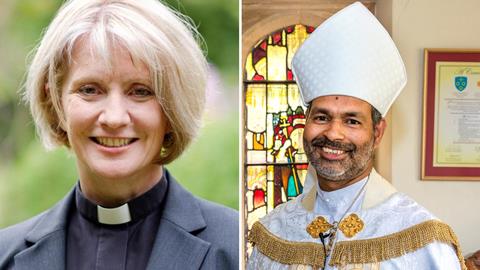When the Bishop of Warrington made a complaint against her boss, the Bishop of Liverpool, she was sent on study leave while he remained in position – until a Channel 4 investigation shone a light on the story. If women are ever to feel safe in the Church, things have to change, says Martine Oborne

Rt Rev Dr John Perumbalath, Bishop of Liverpool (pictured, right), recently announced that he was retiring from ministry.
The news came after a Channel 4 investigation revealed two women had alleged sexual misconduct against him.
One, Rt Rev Beverly Mason, Bishop of Warrington (pictured, left), confirmed that she had made a complaint against Perumbalath in March 2023, before he was installed as Bishop of Liverpool. But rather than suspending him while a full investigation was carried out, the CofE instead encouraged Bishop Beverly to take “extended study leave” as a “pastoral response” to her complaint.
Given the prevalence of such stories in the Church of England, the case raises important questions about whether women are safe in the Church. And the answer to that question is both an emphatic ‘yes’ and ‘no’.
If we are serious about making the Church a safe place, we need to acknowledge the abuse and sexism that many have experienced
Yes, because women are not generally vulnerable in the same sense that children and some adults may be. We are capable of reporting assaults and misconduct to the appropriate authorities, both within the Church and externally in the case of crimes. But no because women still find it difficult to report assault and harassment in the Church and are often discouraged from doing so. When they do, their allegations may not be heard or taken seriously. If this were not the case, people would not have to resort to taking their stories to the press.
The main problem, however, is not so much inadequate processes as a culture of both sexism and abuse of women inside the Church, as well as outside it.
Sexism and abuse
Sexism takes many forms. It can be an outright contempt or prejudice towards women – which many women have experienced through, for example, blanking and insults from male colleagues. It can be subtle: men stating that they value women equally but limiting the ministries and roles they are allowed to perform, leading women to doubt their God-given callings and abilities.
It can be the stereotyping of women, polarising them into a virgin/temptress dichotomy - either seen as innocent, naive creatures or manipulative and deceitful. Sexism can also be internalised by women themselves. We end up believing toxic messages about who we are and seek to make ourselves smaller in order to pander to some men’s insecurities.
The abuse that flows from sexism also takes many forms. It might be blatant sexual or physical abuse. It might be subtle emotional abuse – using belittling words or put downs to make women feel stupid and small. It might be spiritual abuse - bad theology and manipulation of scripture to control and reduce the personhood of women. All these forms of abuse are ways of gaining power and control over women.
In this context, it’s important that women are listened to when they report experiences of sexism and abuse.
Abuse in the Church
In the Church environment, it can take much courage to report abuse. When they do, women often find themselves being dismissed by church leaders as hysterical. They might be told: “Oh he didn’t mean it” or: “It was unboundaried behaviour” – treating the alleged abuser like a mischievous puppy. Women are expected to be nice, keep smiling, calm down, forgive and let it go – often being reminded of the good work the alleged abuser does and the potential damage to the reputation of the Church, if reports of abuse come to light.
If we are serious about making the Church a safe place for women, we first need to acknowledge the abuse and sexism that most women have experienced. Psychotherapist, ex-pastor and researcher, Andrew Bauman, surveyed 2,800 women in the US and found that 82 per cent had experienced sexism in the Church - and more than half reported a severe experience of sexism.
Women still find it difficult to report assault and harassment in the Church and are often discouraged from doing so
We also need to recognise that bad theology and harmful teaching has demonised and subjugated half the population. We must refuse to engage in hierarchical behaviour and address unhealthy systems of power, celebrity, competitiveness, secrecy and self-protection. Furthermore, we need to witness to the truth of the gospel by being transparent about abuse and confessing and lamenting our failures.
For this to happen, we must start treating women as equal to men. It is time to bring institutional discrimination against women to an end. It’s impossible to tackle bias, whether conscious or not, if we still allow churches to say no to having women either at the altar or in the pulpit.
Let’s start encouraging each other to speak out about abuse, rather than being pressurised into covering it up, and use this new honesty to herald a new culture where everyone, both women and men can fully be our God-given selves without fear or restraint.
The Women and the Church (WATCH) conference, Not Equal Yet, takes place on Saturday 29 March at St John’s Church, Waterloo, London. More details can be found here



































No comments yet